As a cockatiel owner, it’s natural to become concerned if you notice your feathered friend shaking. Shaking in cockatiels can indicate a variety of underlying causes, some of which may require immediate attention.
If you’re wondering ‘Why does my cockatiel shake’, here’s your answer. Cockatiels can shake due to extreme cold or a chilling environment. Fear, stress, or nutritional deficiency can also be the reason. In some cases, it’s a sign of the arrival of mating season or feather preening.
Read on to explore eight different reasons why your cockatiel might be shaking. We will also provide potential solutions to address these issues.
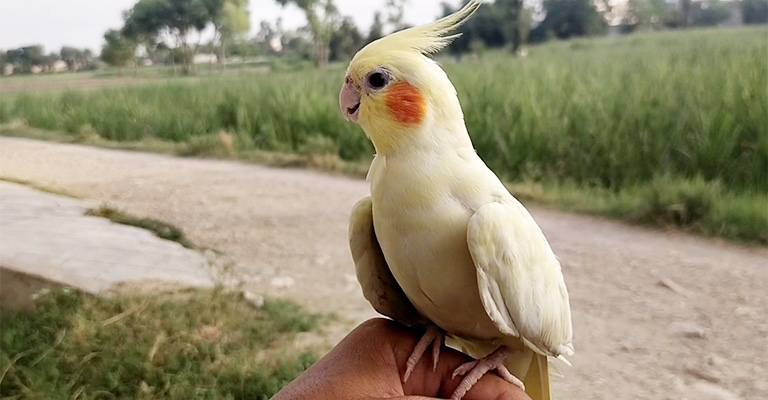
Why Is My Cockatiel Shaking? – Potential Reasons
From feeling cold to reacting to stress, Cockatiels shake their bodies for several reasons. You must address this issue carefully and find out what’s the actual cause.
Here are a few potential reasons why your Cockatiel might be shaking-
Cold or Chilling
Just like other birds, Cockatiels are sensitive to extreme temperatures. If your bird is exposed to cold drafts or low temperatures, it may start shaking as a way to generate body heat. Ensure that your cockatiel’s living environment is adequately warm, especially during colder seasons.
Fear or Anxiety
Cockatiels may shake when they feel fearful or anxious. This could be due to loud noises, sudden movements, or the presence of unfamiliar people or animals. Providing a safe and secure environment for your bird, along with positive reinforcement and socialization, can help alleviate their anxiety.
Illness or Infection
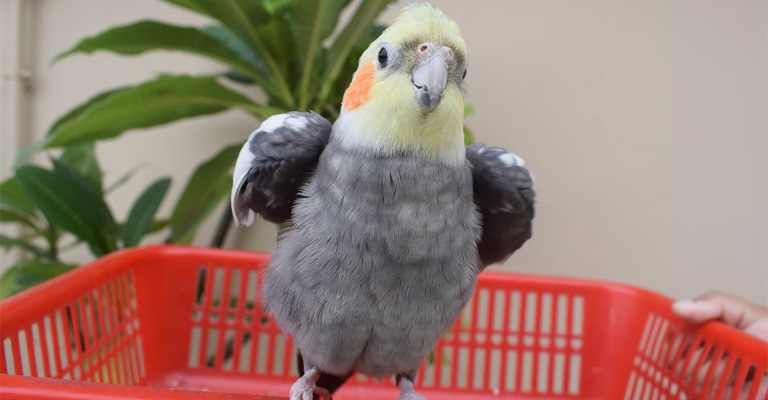
Shaking can be a symptom of an underlying health issue. Cockatiels may shake when they are unwell, experiencing pain, or fighting off an infection. If you notice other signs of illness, such as changes in appetite, feather plucking, or lethargy, it is essential to seek veterinary care promptly.
Stress
As Cockatiels are susceptible to stressful situations, stress and anxiety can cause them to shake. Changes in their environment, such as moving to a new home, the introduction of a new pet, or a lack of mental stimulation, can all contribute to stress.
Maintaining a consistent routine, providing enrichment activities, and creating a peaceful atmosphere can help minimize stress in your cockatiel.
Nutritional Deficiencies
A poor diet lacking essential nutrients can lead to shaking and other health issues in cockatiels. Ensure that your bird’s diet is well-balanced, consisting of high-quality pellets, fresh fruits and vegetables, and occasional treats.
Consult with an avian veterinarian for specific dietary recommendations for your cockatiel.
Mating Behavior
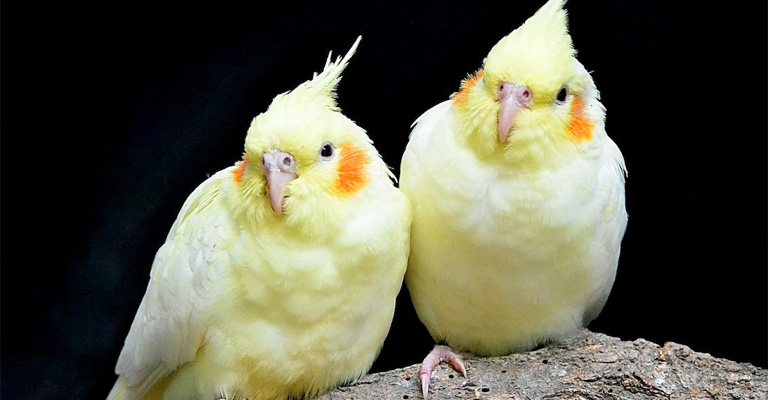
During mating season, male cockatiels often display various behaviors, including shaking or vibrating their wings. This is a normal behavior associated with courtship and should not be a cause for concern.
However, if the shaking continues outside of mating season or is accompanied by other abnormal behaviors, it is advisable to consult a veterinarian.
Feather Preening
Cockatiels regularly preen their feathers to keep them clean and in good condition. During preening, they may shake their feathers vigorously, resembling a shivering motion. This behavior is normal and helps to realign the feathers.
Age and Body Development
Juvenile cockatiels may shake as they are still developing their motor skills and coordination. This shaking is typically temporary and diminishes as the bird grows and becomes more adept at controlling its movements.
If the shaking persists or is accompanied by other concerning symptoms, consult a veterinarian for further evaluation.
How to Treat If My Cockatiel Is Shaking?
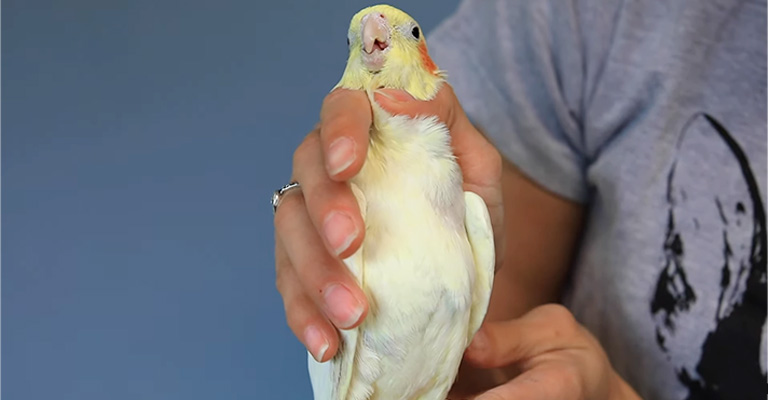
Thankfully, you can easily treat your Cockatiel when it’s shaking. But first, you must find out what’s causing the bird to shake. After that, you can take the following measures-
Maintain a Comfortable Temperature
Ensure that your cockatiel’s environment is warm and free from drafts. Provide a heat source, such as a ceramic heat emitter or heated perch, especially during colder months
Reduce Stressors
Identify and eliminate potential stressors from your cockatiel’s surroundings. Create a quiet and calm environment, away from loud noises or sudden disturbances. Provide hiding spots or safe areas where your bird can retreat if they feel anxious.
Veterinary Examination
If your cockatiel’s shaking persists or is accompanied by other concerning symptoms, schedule a veterinary check-up. A professional can perform a thorough examination and diagnose any underlying health issues.
Nutritious Diet
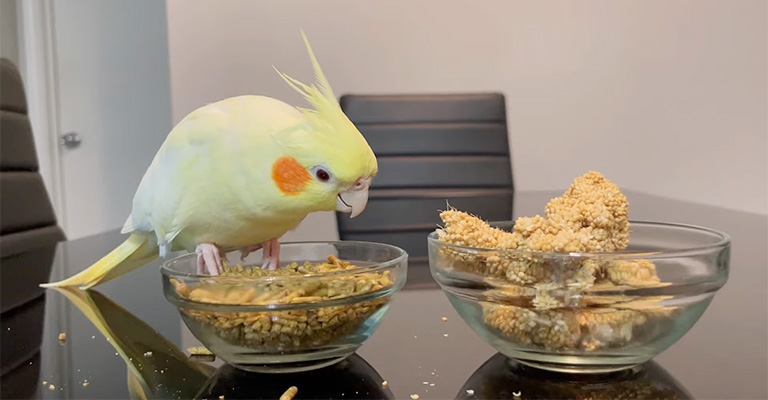
Ensure that your cockatiel’s diet is well-balanced and contains all the necessary nutrients. Consult with an avian veterinarian for specific dietary recommendations and supplements if needed.
Regular Exercise and Mental Stimulation
Cockatiels are active birds that require physical exercise and mental stimulation. Provide toys, puzzles, and opportunities for flight within a safe environment to keep your bird engaged and prevent boredom.
Gentle Handling and Positive Reinforcement
Handle your cockatiel with care and gentleness, using positive reinforcement techniques to build trust and reduce anxiety. Avoid sudden movements or forceful interactions that may cause fear or stress.
Regular Grooming
Assist your cockatiel with feather maintenance by offering regular opportunities for preening. Gently misting them with lukewarm water can also help with feather health and reduce shaking.
Medication and Treatments
Depending on the underlying cause of the shaking, your veterinarian may prescribe medications or treatments to address specific health conditions. Follow their recommendations and administer any prescribed medications as instructed.
Why Is My Cockatiel Shaking from Different Body Parts?
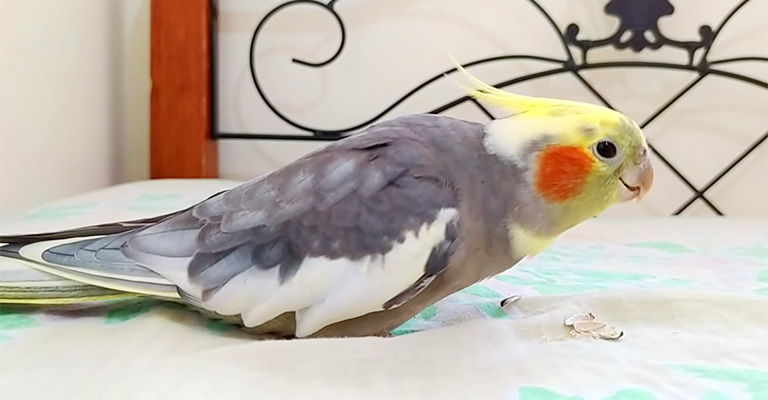
Unusual shaking can occur at different parts of the body. Check out the following symptoms and see the possible reasons and treatments.
Head-Shaking
Cockatiels may shake their heads as normal behavior to remove debris or to adjust their balance. However, excessive head shaking may indicate an ear infection, respiratory issues, or discomfort. Consult a veterinarian if the shaking persists or is accompanied by other symptoms.
Leg or Foot Shaking
Shaking in the legs or feet could be a sign of pain, injury, or an underlying medical condition affecting the bird’s mobility. If your cockatiel is favoring one leg or shows signs of lameness, consult with a veterinarian for a proper diagnosis and treatment.
Wing Shaking
This behavior is more common in male Cockatiels. Wing shaking is often observed during courtship displays. It can also occur when the bird is stretching its wings or preening.
However, if the wing shaking is accompanied by other abnormal behaviors or signs of distress, it is advisable to consult a veterinarian.
Tail Shaking
Similar to wing shaking, tail shaking is a common behavior during courtship or in response to excitement. It can also occur during feather maintenance.
However, persistent or repetitive tail shaking may indicate discomfort or an underlying medical issue. Monitor your cockatiel closely and consult a veterinarian if you have concerns.
Whole Body Shaking
As mentioned above, whole-body shaking can be a response to fear, stress, or discomfort. It can also occur during preening or after bathing.
However, if the shaking is excessive, persistent, or accompanied by other concerning symptoms, consult a veterinarian for a thorough evaluation.
FAQs
Yes, shaking can be a normal response to excitement in cockatiels. It often occurs during courtship displays or when the bird is engaged in play.
No, shaking after a bath is a normal behavior for cockatiels. It helps them dry their feathers and realign them properly.
Occasional leg shaking is generally normal, especially during grooming or stretching. However, if the shaking becomes persistent or is accompanied by other signs of discomfort, consult a veterinarian.
Ensure that the temperature in your cockatiel’s environment is warm and free from drafts. Provide a heat source if necessary. Such sources of heat include ceramic heat emitter and avoid exposing your bird to cold temperatures.
Bottom Line
That was all about why my Cockatiel shake. Shaking in cockatiels can have various underlying causes, including temperature changes, fear or anxiety, illness, stress, nutritional deficiencies, and mating behavior.
If you notice your cockatiel shaking, it is crucial to observe its behavior closely and look for any accompanying symptoms. Providing a warm and stress-free environment, ensuring a nutritious diet, and seeking veterinary care when necessary are essential steps to address the shaking and promote your cockatiel’s well-being.